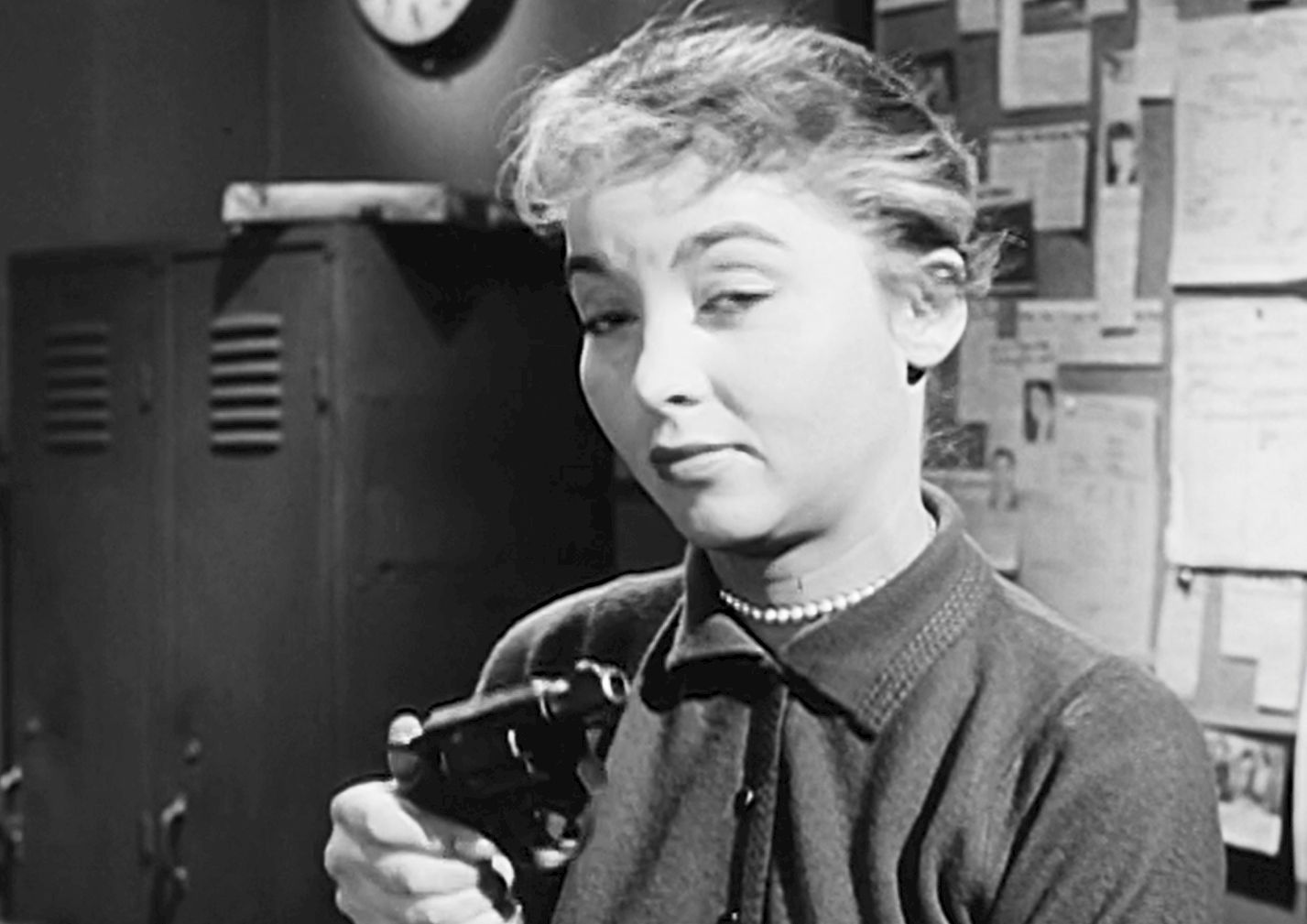
“Down the line, you name it, we’ve done it. Today, tomorrow, next week, we’ll pose as hostesses, society girls, models – anything and everything the department asks us to be. There are 249 of us in the department. We carry two things in common wherever we go: a shield, called a potsie, and a .32 revolver. We’re New York’s finest. We’re policewomen.”
— Patricia Jones, Episode 1
If you asked people what was the first American TV show to feature a policewoman, I suspect not many people would get the answer correct. Some might go with Cagney and Lacey. Others might be able to dig a little further back into their memories, and come up with either Get Christie Love! or Police Woman. Maybe some would include The Mod Squad. But the actual pioneer dates back more than fifteen years before Angie Dickinson began patrolling the streets of Los Angeles. The honour goes to Beverly Garland, the star of Decoy. While now largely forgotten, the show ran for 39 episodes on syndicated television, from October 1957 through the following July. It was also one of the first shows to film on location around New York, and the footage of those scenes is a remarkable time-capsule of life in that era.
Garland was already a well-established actress, her career having started with a role in 1949’s noir classic, D.O.A. She was Emmy-nominated for for her work on 1955’s Medic, and around the same time, was employed on a number of occasions with B-movie legend Roger Corman. Two of those films have already been covered here: Gunslinger and Swamp Women. I will not, however, be covering their work together on It Conquered the World… She later said of Corman, “Roger was always very professional, except when it came to putting us up in a good hotel or giving us a decent meal.” On that basis, the humdrum tedium of a television series might have come as a welcome break, albeit with a punishing schedule that offered little slack. She fell ill one week, during the filming of episode “Across the World”, and rather than pause filming, the script simply was rewritten to minimize her involvement.
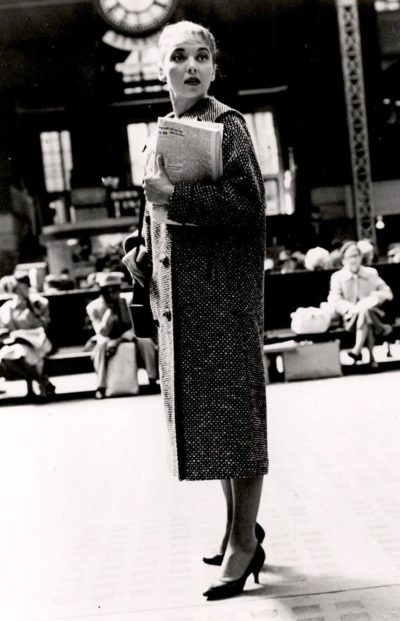 With a lot of voice-overs, the style feels reminiscent of Dragnet, which had been a very popular show for most of the fifties. Each episode opens with a stern reminder: “Presented as a tribute to the Bureau of Policewomen, Police Department, City of New York,” and centre on the cases worked by Patricia “Casey” Jones (Garland). As the title suggests, most of them involve Jones going undercover in some guise. That covers an extremely broad range of assignments, from a photographer to a junkie, a nurse to a blackmailer, a high society girl to a prisoner. However, some of the episodes do not require such subterfuge, though there is a tendency for these crimes she is given for investigation to be fairly gynocentric, e.g. trying to find a delinquent father.
With a lot of voice-overs, the style feels reminiscent of Dragnet, which had been a very popular show for most of the fifties. Each episode opens with a stern reminder: “Presented as a tribute to the Bureau of Policewomen, Police Department, City of New York,” and centre on the cases worked by Patricia “Casey” Jones (Garland). As the title suggests, most of them involve Jones going undercover in some guise. That covers an extremely broad range of assignments, from a photographer to a junkie, a nurse to a blackmailer, a high society girl to a prisoner. However, some of the episodes do not require such subterfuge, though there is a tendency for these crimes she is given for investigation to be fairly gynocentric, e.g. trying to find a delinquent father.
As well as the voice-overs, Jones would quite frequently break the fourth wall and address the audience directly – the quote at the top of the article is one such monologue. It feels quite groundbreaking, and is definitely helped by Garland’s commitment to delivering lines which, in other hands, could potentially seem cheesy. I was also genuinely impressed how gritty and, on occasion, dark the stories were, especially considering the era. Death is a frequent visitor, and the topics concerned get heavy, including drug abuse, mental illness and domestic abuse. While everything more or less ends up all right in the end, in that the guilty receive their just deserts, there is considerably more moral gray than I expected. Considering each episode is typically only 24 minutes long, they pack a lot in, and still manage to achieve a considerably emotional wallop on occasion.
Outside of Garland, there were no real “regulars”. The IMDb lists the next most frequent actors, such as Frank Campanella, who played Lieutenant Cella, as appearing in only three episodes. However, there were a lot of faces who made guest appearances, that would go on to more significant roles later in their careers. Those include Ed Asner, Peter Falk, Larry Hagman, Diane Ladd, Al Lewis and Suzanne Pleshette. They helped the show receive warm reviews, Billboard praising Garland in particular: “Aided by a versatile acting range – and a camera-soothing face which combines the high-cheekboned femininity of Greer Garson with the sexiness of Sophia Loren – she manages to be simultaneously a convincing New York City cop and the kind of girl who would make a charge account at Cartier’s worthwhile.” They proclaimed, “Not since Marilyn’s famed walkaway in Seven Year Itch has the camera ogled such a distracting New York pedestrian.”
It’s difficult to be sure whether or not the show was a success, operating as it did outside of the traditional network in the syndicated marketplace. The pre-sales appear to have been brisk with one bulk pre-release sale covering half of the $1.2 million cost for the entire 39-episode run. However, in May 1958, as production was drawing to a close on the first season, the plug was pulled on further episodes, allegedly because producers lacked sufficient funds to continue. The concept of a series about a policewoman would go back into the vaults for years, but Garland would continue her career over the coming decades, both in television and movies. She eventually became the go-to actress when a mom was needed, filling that role in My Three Sons, The Scarecrow and Mrs. King and Lois & Clark: The New Adventures of Superman.
Her legacy in this show stands the test of time surprisingly well. While it may feel dated in a number of aspects (there’s so much smoking!), the character of Casey feels decades ahead of its time. There’s no fluff, in the sense of romantic liaisons: indeed, we know very little about Jones’s life outside of the force. The short-form approach just doesn’t have time to mess around with extraneous filler like that. While it frequently deals with moral issues, the show doesn’t use itself as a platform to lecture the viewer: you’re left to draw your own conclusions. Certain recent works could learn a thing or two there. She’s respected by her colleagues, and it’s no surprise Garland would say that women often told her she inspired them to join the police force. It’s a show that deserves more recognition than it has received, and with many of the episodes in the public domain, is ripe for rediscovery.
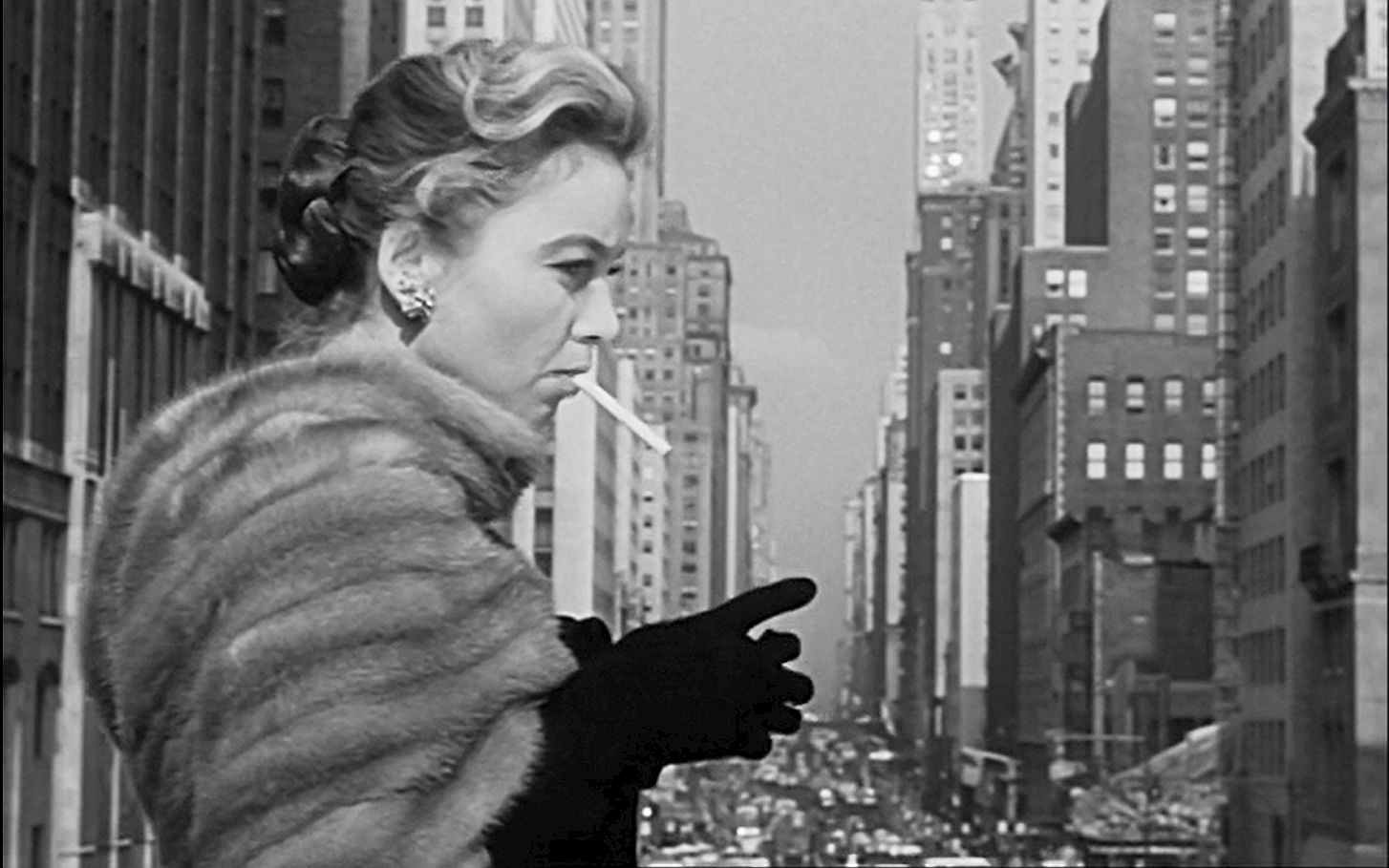
 After a year which has been filled with disappointments and films which have failed to generate much reaction beyond a mild “Meh,” it’s nice to see one which certainly surpasses expectations. Indeed, with about two months left to go in 2023, this would certainly be a finalist for GWG Film of the Year, were there to be such an award, and potentially could walk away with that hypothetical trophy. It’s the kind of movie which, even when you know exactly what’s about to happen, still delivers in a way that can generate an undeniable reaction. Considering my expectations going in were not much more than the made-for-TV level – this being a BET channel exclusive – it surpassed those greatly.
After a year which has been filled with disappointments and films which have failed to generate much reaction beyond a mild “Meh,” it’s nice to see one which certainly surpasses expectations. Indeed, with about two months left to go in 2023, this would certainly be a finalist for GWG Film of the Year, were there to be such an award, and potentially could walk away with that hypothetical trophy. It’s the kind of movie which, even when you know exactly what’s about to happen, still delivers in a way that can generate an undeniable reaction. Considering my expectations going in were not much more than the made-for-TV level – this being a BET channel exclusive – it surpassed those greatly. The heroine is Tabby Temple (Amuka-Bird), a deputy in a small, rural North Washington town (albeit one entirely faked in Kosovo!). She is just heading back to work following an extended lay-off due to a broken ankle. The reason for this injury is not immediately clear. Nor is the reason why she is no longer a chief deputy, but it appears to be something to do with her troubled teenage son, Monty (Morris). She returns to find the police station in some turmoil, due to a burglary the previous night, while an investigation is also under way regarding the murder of a local drug dealer. Sheriff Eddie Reynolds (Kunz) goes out to visit a suspect, leaving Tabby behind, to guard domestic abuse prisoner Earl Macready (Socha), and await the arrival of a locksmith to install new station locks.
The heroine is Tabby Temple (Amuka-Bird), a deputy in a small, rural North Washington town (albeit one entirely faked in Kosovo!). She is just heading back to work following an extended lay-off due to a broken ankle. The reason for this injury is not immediately clear. Nor is the reason why she is no longer a chief deputy, but it appears to be something to do with her troubled teenage son, Monty (Morris). She returns to find the police station in some turmoil, due to a burglary the previous night, while an investigation is also under way regarding the murder of a local drug dealer. Sheriff Eddie Reynolds (Kunz) goes out to visit a suspect, leaving Tabby behind, to guard domestic abuse prisoner Earl Macready (Socha), and await the arrival of a locksmith to install new station locks.




 I can’t recall seeing an action heroine movie with
I can’t recall seeing an action heroine movie with  Okay, I will admit that this strained credibility on a number of occasions, to the point that buttons were popping off its shirt. But I don’t think the makers were exactly going for gritty realism, and the bottom line is: I enjoyed this a lot. Certainly, more so than
Okay, I will admit that this strained credibility on a number of occasions, to the point that buttons were popping off its shirt. But I don’t think the makers were exactly going for gritty realism, and the bottom line is: I enjoyed this a lot. Certainly, more so than  Turns out, Erin has a past, and the publicity resulting from her impromptu heroism brings it to visit. She finds herself embroiled in murder, organized crime and police corruption, as well as more normal familial drama, such as neighbourhood jealousy and whiny pre-teen nonsense. One of the seven 45-minute episodes is entirely in flashback (unexpected Jamie Bamber!), explaining the reason she changed her identity and moved to Spain, as well as why those from her history are keen to catch up with her. Even the spectacularly unobservant Jordi begins to realize that his other half is not quite as claimed. Her original explanation of a relapse into alcoholism doesn’t exactly explain all the sudden absences, injuries and unusual behaviour Erin is now exhibiting, as she tries to manage the escalating situation.
Turns out, Erin has a past, and the publicity resulting from her impromptu heroism brings it to visit. She finds herself embroiled in murder, organized crime and police corruption, as well as more normal familial drama, such as neighbourhood jealousy and whiny pre-teen nonsense. One of the seven 45-minute episodes is entirely in flashback (unexpected Jamie Bamber!), explaining the reason she changed her identity and moved to Spain, as well as why those from her history are keen to catch up with her. Even the spectacularly unobservant Jordi begins to realize that his other half is not quite as claimed. Her original explanation of a relapse into alcoholism doesn’t exactly explain all the sudden absences, injuries and unusual behaviour Erin is now exhibiting, as she tries to manage the escalating situation.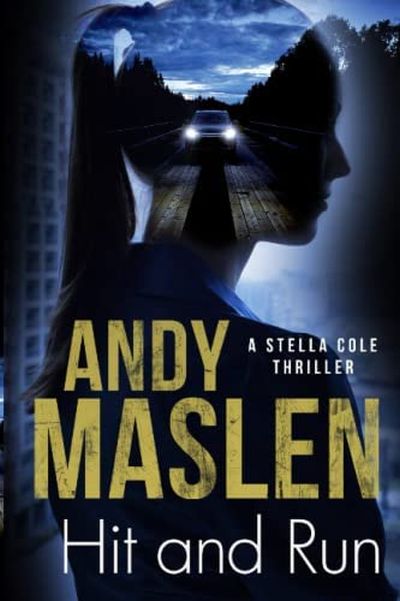 Detective Inspector Stella Cole has her life turned upside down when her lawyer husband is killed in a hit-and-run accident, leaving her to bring up daughter Lola on her own, and struggling with an addiction to both booze and painkillers – anything to numb the pain of everyday existence. Though the driver in question is arrested, he receives a paltry sentence of only three years, and Stella begins to plot taking her own revenge. This is brought up short when the perpetrator is killed in prison, and evidence begins to accumulate that her husband’s death may not have been accidental.
Detective Inspector Stella Cole has her life turned upside down when her lawyer husband is killed in a hit-and-run accident, leaving her to bring up daughter Lola on her own, and struggling with an addiction to both booze and painkillers – anything to numb the pain of everyday existence. Though the driver in question is arrested, he receives a paltry sentence of only three years, and Stella begins to plot taking her own revenge. This is brought up short when the perpetrator is killed in prison, and evidence begins to accumulate that her husband’s death may not have been accidental. To be honest, it’s more character- than action-driven overall, yet that’s its strength, since it does a great job of creating people who feel “real”. Nobody here is perfect: everyone has flaws, and struggles to cope with life’s ups and downs. Maggie is the focus, having to operate in an era when casual disregard for a woman’s talents was the norm. Not least by her Scottish colleague, Bob Croft (Gwaspari), though he eventually came to appreciate her many talents, such as Forbes’s fierce devotion to justice. Fortunately, her boss, Detective Chief Inspector Bill Russell (Marlowe) always had her back, even if his approach means cutting her no slack either. But every episode seemed to have one or more great performance, taking advantage of the vast pool of top-tier British character actors.
To be honest, it’s more character- than action-driven overall, yet that’s its strength, since it does a great job of creating people who feel “real”. Nobody here is perfect: everyone has flaws, and struggles to cope with life’s ups and downs. Maggie is the focus, having to operate in an era when casual disregard for a woman’s talents was the norm. Not least by her Scottish colleague, Bob Croft (Gwaspari), though he eventually came to appreciate her many talents, such as Forbes’s fierce devotion to justice. Fortunately, her boss, Detective Chief Inspector Bill Russell (Marlowe) always had her back, even if his approach means cutting her no slack either. But every episode seemed to have one or more great performance, taking advantage of the vast pool of top-tier British character actors.
 With a lot of voice-overs, the style feels reminiscent of Dragnet, which had been a very popular show for most of the fifties. Each episode opens with a stern reminder: “Presented as a tribute to the Bureau of Policewomen, Police Department, City of New York,” and centre on the cases worked by Patricia “Casey” Jones (Garland). As the title suggests, most of them involve Jones going undercover in some guise. That covers an extremely broad range of assignments, from a photographer to a junkie, a nurse to a blackmailer, a high society girl to a prisoner. However, some of the episodes do not require such subterfuge, though there is a tendency for these crimes she is given for investigation to be fairly gynocentric, e.g. trying to find a delinquent father.
With a lot of voice-overs, the style feels reminiscent of Dragnet, which had been a very popular show for most of the fifties. Each episode opens with a stern reminder: “Presented as a tribute to the Bureau of Policewomen, Police Department, City of New York,” and centre on the cases worked by Patricia “Casey” Jones (Garland). As the title suggests, most of them involve Jones going undercover in some guise. That covers an extremely broad range of assignments, from a photographer to a junkie, a nurse to a blackmailer, a high society girl to a prisoner. However, some of the episodes do not require such subterfuge, though there is a tendency for these crimes she is given for investigation to be fairly gynocentric, e.g. trying to find a delinquent father.
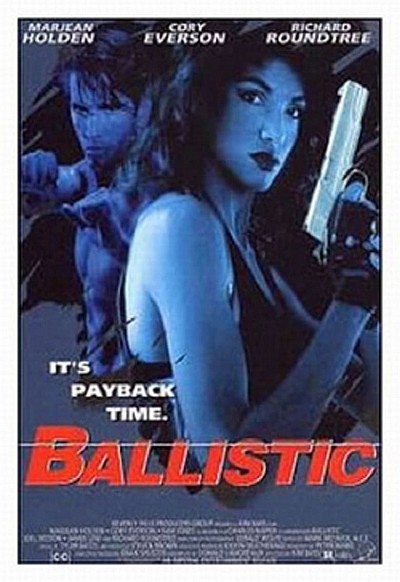 You know you’re in for a slice of stinky, nineties action cheese from the opening sequence. Undercover cop Jesse (Holden) has just taken down a sleazy yuppie drug-dealer, and a homeless woman tells her, “You know what you are, sweetie? You’re ballistic!” We probably need to explain why the film is titled that way, because there’s really not an enormous amount of great action here to justify it. Jesse is your typical, no-nonsense cop, who has just transferred from homicide to the Urban Crime Taskforce, where she is meeting resistance from her new colleagues. She is also trying to help her father (Roundtree), a former cop now doing 20 years after being framed with kilos of coke.
You know you’re in for a slice of stinky, nineties action cheese from the opening sequence. Undercover cop Jesse (Holden) has just taken down a sleazy yuppie drug-dealer, and a homeless woman tells her, “You know what you are, sweetie? You’re ballistic!” We probably need to explain why the film is titled that way, because there’s really not an enormous amount of great action here to justify it. Jesse is your typical, no-nonsense cop, who has just transferred from homicide to the Urban Crime Taskforce, where she is meeting resistance from her new colleagues. She is also trying to help her father (Roundtree), a former cop now doing 20 years after being framed with kilos of coke. This feel like it could easily have come out of the nineties, with the distinct whiff of a throwback to the golden age of Hong Kong “girls with guns” movies. That is, of course, not a
This feel like it could easily have come out of the nineties, with the distinct whiff of a throwback to the golden age of Hong Kong “girls with guns” movies. That is, of course, not a 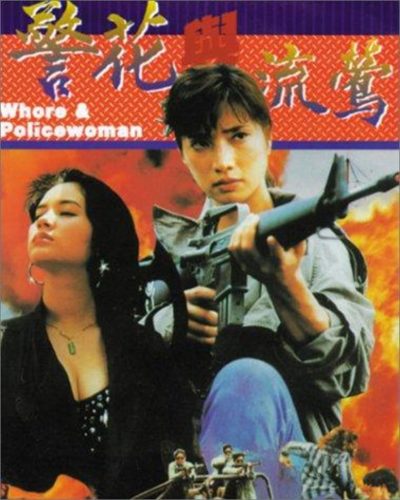 If the title is more than a bit blunt, it’s certainly accurate. May Lin (Cheng) is a brash hooker, who runs a sideline in blackmail videos with her flatmate, Nana. But one night she comes home to find Nana near death, the victim of a brutal client. She tells the police about the video, but before she can give it to them, the perpetrator – rich and influential politician, Kao Tien Chin (Cho) – sends an army of beige trenchcoat wearing killers to take care of both Nana and May. The former succumbs, but the latter escapes and goes on the run. With the police force apparently leaking like a sieve and the case being shut down from on high, prosecutor Yin Li Shan sends his niece, Nancy Cheng (Mishiwaki), to link up with May and bring her in. But they’ll have to get past the trenchcoat mafia, among other threats, for there to be any hope of justice.
If the title is more than a bit blunt, it’s certainly accurate. May Lin (Cheng) is a brash hooker, who runs a sideline in blackmail videos with her flatmate, Nana. But one night she comes home to find Nana near death, the victim of a brutal client. She tells the police about the video, but before she can give it to them, the perpetrator – rich and influential politician, Kao Tien Chin (Cho) – sends an army of beige trenchcoat wearing killers to take care of both Nana and May. The former succumbs, but the latter escapes and goes on the run. With the police force apparently leaking like a sieve and the case being shut down from on high, prosecutor Yin Li Shan sends his niece, Nancy Cheng (Mishiwaki), to link up with May and bring her in. But they’ll have to get past the trenchcoat mafia, among other threats, for there to be any hope of justice.